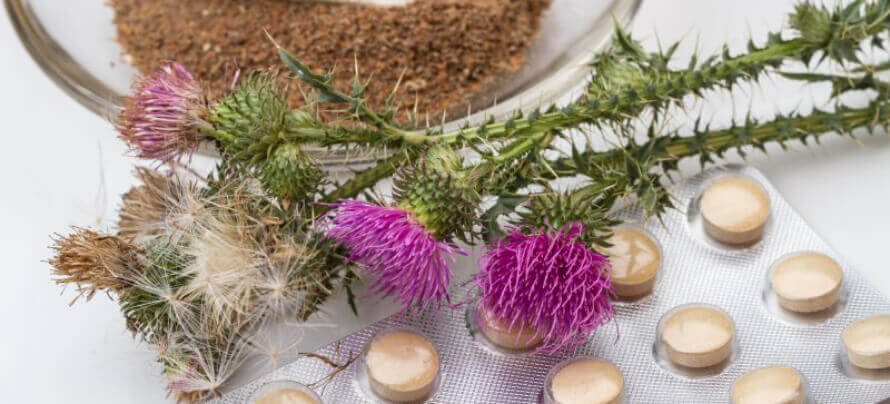Key Takeaways
- Milk thistle is an edible thistle that has long been used to help with an assortment of liver disorders, including as an antidote to cap mushroom poisoning.
- The protective effects are strongest in those who need it least, and relatively weak in those who need it most, making it relatively lackluster at times.
- Milk thistle is a good supplement to consider for people who suspect that they have, at some point, damaged their livers (like excess alcohol or steroid usage) but not to the point of hospitalization.
I love simple names for plants.
That mushroom looks like a turkey’s tail, what should we call it? Turkey Tail.
What should we call this plant oh god it smells like a horse…hmm, let’s go with that then, “smell of horse.” I think in sanskrit it’s spelt Ashwagandha?
What do you think of this delicious mushroom friend? Oh, foaming at the mouth I see, convulsing in pain I see. I will call this particular cap “Death Cap” mushroom in honor of Paul over here. I really should tell the physician about this.
So when the doctor then went to get the cure, saw it was a thistle, and it appeared to be secreted milk he didn’t get overly complicated—oh look, it’s milk thistle!
It’s a good thing he picked up this milky thistle as well, since their weird observation of “cows make milk yet this is not a cow what is happening?” led to what is perhaps the first major liver health supplement on the market.
In this article you’ll learn what milk thistle is, why it’s seen as an all-purpose liver health supplement, and why in reality it’s a more specific repair supplement for the liver with regenerative properties mostly after the damage is gone.
Table of Contents
+
What Is Milk Thistle?
Milk thistle is the common name for Silybum marianum from the family Asteraceae. It’s also known by other names such as the Marian thistle, St. Mary’s thistle, or heal thistle.
It’s name is surprisingly straight forward, as milk thistle is indeed an edible thistle whereas the “milk” refers to how this plant has white veins and sometimes secretes a milky liquid.
It’s name, and medicinal history, date back to Grecian and Roman medicine primarily— some evidence suggests that there was limited medicinal usage in both China and India as well.
The medicinal history of milk thistle is that of a liver cure-all, where if something was wrong with the general liver area you were prescribed milk thistle for it. There were some more targeted uses, like for stimulating bile secretion and for protecting against death cap mushroom poisoning, as well as claims surrounding breastfeeding and depression.
This cure-all history has led to milk thistle, in modern ages, being perhaps the best-selling herb for liver health and recommended for pretty much anything—liver damage, reducing hangovers, and fighting against the side-effects of alcohol for example.
Why Do People Take Milk Thistle?

The primary reason people take milk thistle is for the silymarin content.
Confusingly, silymarin is not a single molecule—it’s a mixture of molecules with similar structural properties known as the flavonolignans. Silybin, isosilybin, silydianin, and other molecules with “sili-” or “sily-” in their name are included in this category.
Now, these molecules have been stated to have both anti-inflammatory and antioxidant properties. While this is true, damn near everything can claim that so I’ll brush over that for now. Besides, milk thistle has two significantly more important and interesting properties.
The first is toxin-blocking, which was first discovered when milk thistle was able to prevent the death cap mushroom from . . . let’s say “performing its namesake” onto the patient.
Death cap normally causes acute liver failure, and milk thistle blocks the transporters that take it up. This results in silybinin (a specific part of silymarin) being quite effective for acute toxicity in this case, although not perfect.
While blocking death cap is a function worth praise, it’s not overly applicable to most of us. It’s like N-acetylcysteine being used to fight of acetaminophen toxicity—sure, credit where credit’s due, but I’d rather avoid the toxins in the first place.
The other properties that set milk thistle apart are claims that it can increase protein synthesis in the liver without acting in either a fibrotic or carcinogenic way—cellular regrowth is good, but not if it leads to large scale fibrosis (near-permanent liver damage) or cancer cell formation.
The evidence for the protein synthesis claim is fairly old, 1986 and such, but generally speaking it seems that RNA and DNA synthesis are increased in liver cells. This would mean enhanced liver regeneration but we don’t really have studies straight up measuring liver weight to prove it.
The anti-fibrotic claims seem to be secondary to the anti-inflammatory claims and are also quite mild if not unimpressive. However, let’s count our blessings where we can, it’s not common for a growth promoting agent to be antioxidant and anti-inflammatory—usually it’s the opposite.
The combination of increased protein synthesis in the liver, as well as “anti-toxin” claims borne from the ability of milk thistle to block death cap, leads to milk thistle being claimed to have widespread benefits.
What Are the Benefits of Milk Thistle?
The benefits of milk thistle tend to be specialized to:
- Mild regenerative properties on the liver.
- Mild antioxidative protection that could extend to other organs (the kidneys).
- Mild rehabilitative effects after stopping alcohol usage.
Not overly exciting.
Milk Thistle and Liver Health
To start with, a general look at liver health.
Milk thistle has been demonstrated to increase antioxidant status in the liver of alcoholics, improve bile acid production in hepatitis, and has various other little successes here and there when measuring the basic parameters of enzymes and antioxidant status.
So I guess, technically, milk thistle does help.
However, milk thistle has also failed numerous times. This is usually when more severe situations are tested like liver health during leukemia treatment, hepatitis patients who are resistant to primary therapy, and other pharmaceutical-grade issues.
Furthermore, despite having many studies in viral conditions such as HIV or (more relevant to the liver) hepatitis C, milk thistle doesn’t appear to have relevant anti-viral properties unless you can get your doctor to straight up inject silybinin—could help other liver issues in people with hepatitis C like ferritin levels, but not going to do much for the viral load itself.
I know what you’re thinking, it’s not common for me to put a supplement in the “works” section then give it a smack down with eight studies, but milk thistle has a sort of “panacea” air about it in the alternative health community.
Milk thistle appears to have evidence supporting the claims of regenerative properties. However, the practical application of these claims is not as impressive as you think. The people who need the regenerative properties the most don’t seem to get them.
Milk Thistle and Kidney Health
When it comes to kidney health there are not many supplements that have any promise, so limited promise with milk thistle is better than nothing.
One study has found that 570 mg of milk thistle, paired with selenium, has helped symptoms of urinary tract ailments (such as abnormal urination patterns) in men. This was thought to be due to the antioxidant and anti-inflammatory properties of milk thistle.
Supplementation of milk thistle after a toxic insult (in this case, the chemotherapeutic known as cisplatin) at 420 mg, however, doesn’t appear to offer any protective effect in humans. Previous animal evidence suggested it did but, eh, shit happens.
Ultimately, milk thistle may have some protective effects to the kidneys but it isn’t overly notable or even unique.
Milk Thistle and Alcohol

I wanted to make alcohol it’s own section since it’s the major issue pertaining to the liver, and a major reason why people seek milk thistle supplementation.
As mentioned earlier, milk thistle can increase antioxidant status in the liver of alcoholics. While this is a good thing it isn’t absolute evidence of help. Antioxidant status can go up while other problems still persist.
For example, a large study from Barcelona found that in alcoholics with liver cirrhosis that milk thistle (450 mg a day) failed to change survival rates at all. In other words, the antioxidant effect of milk thistle is not strong enough to protect you against alcohol.
Pairing the above “failure to save lives” with the fact that, if taken simultaneously, milk thistle can make alcohol even more toxic (more on this later) it shows that milk thistle is not something you want circulating in your blood while drinking.
What about after drinking? Well, many people do supplement milk thistle in the morning (ideally with some food) in hopes of negating a hangover but there is no evidence on this topic.
Milk thistle may be of potential use to people who have stopped drinking, but for people who have alcohol on a regular basis it’s either a lackluster protective agent or potentially harmful.
What Does Milk Thistle Not Do?
It’s not common that the perceived jack of all trades is also a one-trick pony, but that appears to be the case here. While the liver reparative role makes it useful in most instances of minor liver disease that’s just the liver.
Claims surrounding milk thistle…
- Increasing breast milk production
- Promoting weight loss
- Helping reduce acne production
. . . appear to be either false or unfounded.
Milk Thistle and Breastfeeding
Milk thistle is reported to be a galactogogue—a term used to refer to compounds that can increase milk production the first few weeks after birth.
There is currently no evidence that supports this function of milk thistle, and the claims surrounding milk thistle here may have been due to confusion with “Blessed thistle” or cardui benedict (a totally different plant that shares a same folk name) or from religious stories of the virgin Mary feeding baby Jesus under the leaves of this plant.
The claims surrounding milk thistle appear to be based on religious stories, not fact.
Milk Thistle and Weight Loss
The previous story, where milk thistle was connected to breastfeeding due to catholic imagery, is something I am rather fond of—a nice story and I can understand how people got confused.
What I dislike is the oh-so common game of telephone where because something has property A, people then talk about B—talking about B? Let’s move on to C. By the time researchers compile even one study on A people are discussing G.
In this case, milk thistle helps the liver. Liver, the thing that detoxes the body? I love detoxes, especially detox teas. Detox teas really help shed the pounds. Shed the pounds? Milk thistle causes weight loss because my 34.7 day detox plan said so.
It’s surprisingly common and, if you’ve read my articles before, such a topic always comes up when I am refuting claims that some herb causes weight loss—it’s always the same story.
No, milk thistle has no evidence nor logic to support claims that it promotes weight loss. Even in studies of people with liver disorders associated with obesity weight loss is not a side-effect.
Milk Thistle and Acne

In looking into this claim, I found an absolute void of evidence. It doesn’t seem that milk thistle has been either tested, or even theorized, as to how it can directly affect acne.
I can only imagine that speculation as to whether milk thistle helps with acne is due to connections with acne and anabolic steroids, which are well known for causing even 40 year old men to break out like teenagers bathing in olive oil.
Milk thistle is one of the first liver health supplements recommended for PCT, or “post-cycle therapy,” which is aimed at reversing the damage to the liver that using anabolics inherently does. During PCT acne goes down tremendously so, I imagine, a link between the two was formed here. But I digress . . .
There is absolutely no evidence, or even published theories, on milk thistle and acne per se.
What Is the Clinically Effective Dose of Milk Thistle?
Silymarin, or specifically the components silybin A and silybin B, are known to have pretty low absorption rates. This can be overcome by simply taking a higher dose, 720 mg or so to be precise. This study also noted that doses of up to 2.1 grams were well tolerated.
This is about the lowest dose for any non-concentrated form of milk thistle supplementation, but it seems that the higher the silymarin content the less of the overall plant you need.
A few studies do use a patented extraction known as MZ-80 which is 120 mg of silymarin taken three times a day, but concentrated to the point where it’d be equivalent to 7.2 grams of the milk thistle fruit’s raw weight.
What Are The Side-Effects of Milk Thistle?
Generally speaking, milk thistle is a well-tolerated supplement with infrequent side-effects of small magnitude.
Milk thistle has been shown to not have the most common drug-drug interactions, namely interacting with the CYP enzymes in the liver when orally ingested. It’s shown these properties in vitro though, so it’s more low risk than no risk outright.
Other potential drug-drug interactions, like with digoxin and nifedipine, have been cleared.
While normally well tolerated, it’s theoretically possible that there is cross-allergenicity (allergic reactions to similar groups of plants) with milk thistle. If you have had allergic reactions to other plants in the Asteraceae family such as kiwi, artichoke, or common thistle then milk thistle may not be for you.
Milk thistle is a very low risk supplement when taken by itself, but it’s possible that people who are allergic to similar plants like kiwi, artichoke, or common thistle could also be allergic to milk thistle.
What’s the Best Way to Take Milk Thistle?
Milk thistle is commonly sold and ingested as a tea, most likely related to breastfeeding claims. Most lactating women avoid pills in what ends up being more of an aesthetic choice than a practical one.
This is a bit problematic since the silymarin, and all the unique flavonolignans that are contained within it, are mostly fat soluble. Preparing a tea from milk thistle, which is simply a hot water extraction, wouldn’t contain these molecules in the tea but rather leave them in the solid residue left over.
There are other compounds that are water-soluble, and thus leached into the water, but these tend to be standard phytochemicals that are found in most plants. This means that milk thistle tea is, likely, just as effective a medicine as (insert any plant) tea.
If you want the benefits associated with milk thistle it’d be best to use capsules or powder. Most parts of the plant are acceptable including the root, seeds, and fruits—just as long as you consume the solids.
What about Milk Thistle Timing?
Milk thistle is one of the few supplements where timing appears to be important. In the case of milk thistle, it can turn a healthy substance into a dangerous one.
Animal studies have noted that, while alcohol can normally cause damage in the liver, that if milk thistle is taken before the alcohol there is some protection but taking the two simultaneously results in even more damage.
Such a trend has been noted in select human studies, where milk thistle taken alongside an anti-tuberculosis drug (which normally caused liver damage) may have exacerbated the damage from the drug.
So the rule of thumb for milk thistle is that it’s first-line assistance for the liver, and should be used only after the damaging factor to the liver (alcohol, steroids, etc.) is no longer being taken. It doesn’t seem prudent to take them simultaneously.
Should I Take Milk Thistle Supplements?

Milk thistle should be considered by people who, when taking an honest look at their lives, haven’t been the kindest to their liver due to their previous habits but are either free from, or distancing themselves, from those habits.
Rather obese and with a bit of non-alcoholic fatty liver disease (NAFLD)? Well, in combination with a diet and exercise plan perhaps some milk thistle could be useful for you—hell, it’s actually been tested alongside berberine for this sort of demographic.
Former alcoholic who is on the up-and-up after appreciating the bottle a bit too much, but got out before you were hospitalized? Congratulations, once you’ve gotten used to not drinking then perhaps add a bit of milk thistle to your routine for a month or two.
“Friend” of yours wanted a test booster and accidentally bought some stupid oral prohormone from that sketchy store downtown? Yeah, orals aren’t kind to the liver, cease usage and wait a week before taking some milk thistle (and perhaps TUDCA as well).
If none of these situations speak to your situation then there should be no need for milk thistle. The liver is pretty good at regenerating by itself anyways, some food and sleep does wonders for minor issues.
The Bottom Line on Milk Thistle
Ultimately, milk thistle is a pretty helpful supplement but at times it may feel a bit overhyped.
It’s major claim to fame is blocking the effects of death cap mushroom, which is amazing, and it seems that it isn’t the only benefit since it can help improve antioxidative status of the liver and seems to be a nice supplemental option for various liver disorders.
However, death cap negation is the only thing it does tremendously. It has routinely failed at saving lives in clinical settings (outside of death cap).
On one hand it’s always nice to see supplements strong enough to be tested alongside the pharmaceuticals—it’s a sign of respect to their potency. On the other hand, you kind of want them to be successful.
In a way, milk thistle is the definition of what a supplement should be. Effective, yet designed for the people who are “not sick enough to see a doctor, yet too sick to not stop complaining”. It’s not the end-all be-all of liver health supplements but it’s a damn good starting point.










